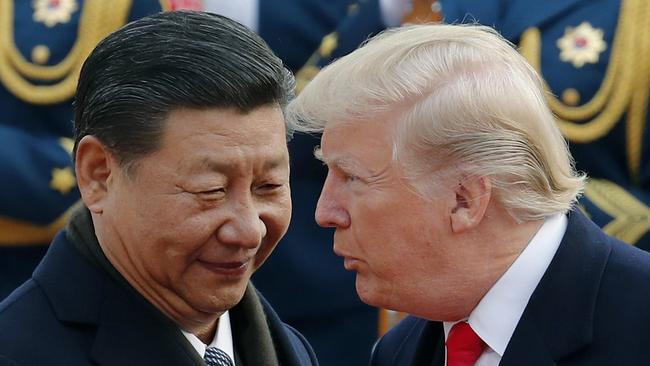China’s cold war warning to Australia: don’t side with US
Chinese state media has issued a blunt warning to Australia not to side with the US in any new cold war.

Donald Trump’s national security adviser, John Bolton, said the Morrison government was increasing its naval co-operation with the US in the contentious South China Sea, as Chinese state media issued a blunt warning to Australia not to side with the Americans in any new cold war.
In an editorial, The China Daily warned Australia not to be “led by the nose” by America.
The editorial said there was a “fragile peace” in the region that could be “shattered by the slightest misstep”.
The editorial was published in response to criticism from Australia and Japan of Chinese militarisation in the South China Sea.
Analysts said the editorial showed Australia was walking a “tightrope’’ between the US and China and risked being wedged by Beijing.
Mr Bolton told a US radio show on Friday that the US was getting more participation from its allies and would be stepping up efforts in the South China Sea.
“We’ve got to do more first to establish for the Chinese that we do not acknowledge the legitimacy of any of (their South China Sea claims),” Mr Bolton said. “We have more participation by allies. The British, the Australians and others, are sailing with us through the South China Sea. We’re going to do a lot more on that.”
Defence Minister Christopher Pyne said: “As we have done for many years we undertake freedom of navigation and overflight, including in the South China Sea, and we support the rights of others to do the same.”
The China Daily editorial said a meeting last week between Australian and Japanese defence and foreign affairs ministers where they condemned Chinese government militarisation in the South China Sea showed the countries were simply on board with a US mission to contain China that was dangerous. “Canberra and Tokyo should not allow the resurgence of the Cold War paranoia that has already taken hold of the US, shape their actions,” The China Daily editorial said.
“(Australian leaders) should realise the full significance of a return of the full-scale mistrust of the Cold War, as it will create a fragile peace that risks being shattered by the slightest misstep. They should be aware that letting the US lead them by the nose as it pursues a confrontational strategy toward China is really not in their best interests.”
US Vice-President Mike Pence recently said China was building its own relationships with America’s allies and enemies that contradicted any peaceful or productive intentions of Beijing.
La Trobe international relations professor Nick Bisley said the speech and Beijing’s actions were evidence the world was in an increasingly overt contest between the two most important countries, and Australia was in the middle.
“Beijing thinks it is in the early phases of a pretty major period of competition with the US and is escalating pressure on those who have interests tied to both sides of this potential new Cold War,” he said yesterday. “Beijing wants to see if it can sense any gaps between Canberra and Washington which it might be able to wedge. I doubt that’s the case and as a consequence the brief ‘defrost’ of the Australia-China relationship may well be over.”
After Australia and China experienced a diplomatic freeze earlier this year, Chinese Foreign Minister Wang Yi signalled China was keen to rebuild relations.
Former Royal Australian Navy rear admiral James Goldrick said while he did not like the use of the term “cold war” to describe the current US policy in response to Chinese behaviour, it did present a dilemma for Australia. “That’s a very hardline,” he told The Australian while pointing out that the US President’s China policy was based on legitimate grievances.
But he said Australia was unlikely to be completely on board with this hardened policy and had a “difficult balancing of its own interests to do”. “Australia should be seen to be pursing an Australian policy to reflect Australia’s interests and concerns … separate from the US in certain ways,’’ he said.
“There are many concerns we share, there are elements of Chinese behaviour on which we need to push back. For instance where China is trying to do the right thing that’s something we should be applauding and accepting.”
The China Daily criticised last week’s statement by Australia and Japan about plans for closer military co-operation, saying they were “one step closer to becoming ‘quasi allies’”.


